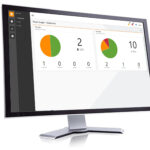During their first appearance to the Malaysian media since their rebranding, Vertiv, formerly known as Emerson Network Power shared how they are still very much in the business of ensuring technology is always up and running.
Sporting a new brand name and with renewed focus upon data centres, communication networks and commercial and industrial sectors, President of Asia Market, Anand Sanghi said, “Our new owners have deep pockets, and they want to make sure that Vertiv behaves like a startup with laser focus on our customers.”
Vertiv will upon their product and service offerings for power, thermal and IT management capabilities with flagship brands like ASCO, Chloride, Liebert, Netsure and Trellis.
Another thing that has remained unchanged also is their service organisation which remains the largest in their industry with 250 service centres globally and over 3000 customer engineers.
Hitesh Prajapati, country manager, Malaysia, Vertiv, said: “This is a momentous year for us as we transform to an independent company and the world’s largest standalone provider of mission-critical technologies for data centers, communication networks and commercial and industrial environments.” Vertiv celebrated their 30th year of operations in Malaysia, last year.
Trends
From the many customers which they have worldwide, Vertiv has gleaned critical information and industry trends, as well as made an observation about the huge growth of edge networks.
There is a lot of demand also for more distributed offices or branches and the nature of these offices that need to be set up quick and conveniently without much help and support from an internal IT team, makes Vertiv’s converged systems solutions very appealing.
These converged systems are a unified infrastructure of thermal, power and IT management resources combined with data centre infrastructure management or DCIM software. Targeting edge network implementations and cloud computing infrastructure, this solution is factory-fitted with a much reduced time to deploy.
Vertiv’s VP of Sales for Southeast Asia, Paul Churchill also believes that businesses will begin to see returns on investment when they implement a truly distributed type of network.
Malaysia
Besides edge networks ramping up in industries like healthcare, retail and even warehousing, Malaysia and Asia at large, are in a phase of optimising their ageing data centre infrastructures. But there is another compelling reason that Malaysia is such an attractive marketplace for Vertiv. True enough, there is already a lot of data centre development in Southeast Asia.
Telcos in this region tend to own their own robust infrastructure and data centres on a co-location basis, so as to be able to provide for their own internal IT needs. But this is slowly changing and bigger telcos, especially incumbents are offering cloud computing services to their customers, consumers and businesses alike.
Churchill observed, “IT hardware in that space is also changing to becoming more software-driven.”
This may impede the growth of data centre floor space, but availability of IT services provided by data centres now becomes more crucial, as does the need for more power and thermal or cooling solutions.
A hyperscaler eyeing Malaysia?
Anand predicted that a large hyperscale data centre player will invest in Malaysia in the next few years.
In fact, other foreign DC players eyeing Malaysia would likely start with a co-location space and then evolve from there.
Anand said, “These players would be concerned about service level agreements but Vertiv has visibility into this (information).”
This bodes well for Vertiv’s service and consultancy organisation, as the wealth of information that their systems collect are giving them a valuable look into what works, what doesn’t and what could work better.
“A large co-location or hyperscale data centre presence has potential to raise GDP of a country by 2 to 4 percentage points,” Anand also added.








